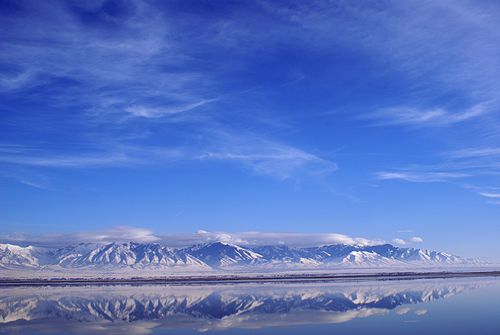Reservoirnoun
A place where anything is kept in store
Reservoirnoun
A large natural or artificial lake used as a source of water supply.
Reservoirnoun
A small intercellular space, often containing resin, essential oil, or some other secreted matter.
Reservoirnoun
A supply or source of something.
Reservoirnoun
A species that acts as host to a zoonosis when it is not causing acute illness in other susceptible species.
Reservoirnoun
A place where anything is kept in store; especially, a place where water is collected and kept for use when wanted, as to supply a fountain, a canal, or a city by means of aqueducts, or to drive a mill wheel, or the like.
Reservoirnoun
A small intercellular space, often containing resin, essential oil, or some other secreted matter.
Reservoirnoun
a large quantity of infectious microorganisms resident in animals other than man, potentially capable of being transmitted to humans.
Reservoirnoun
a large quantity of infectious microorganisms or parasites resident in animals other than man, potentially capable of being transmitted to humans; especially, such organisms in animals where they do little or no harm to the host.
Reservoirnoun
a large supply or stock of anything which may be rapidly put to use; a reserve.
Reservoirnoun
a large or extra supply of something;
Reservoirnoun
lake used to store water for community use
Reservoirnoun
tank used for collecting and storing a liquid (as water or oil)
Reservoirnoun
anything (a person or animal or plant or substance) in which an infectious agent normally lives and multiplies;
Reservoir
A reservoir (; from French réservoir [ʁezɛʁvwaʁ]) is most commonly an enlarged natural or artificial lake created using a dam to store water. Reservoirs can be created in a number of ways, including controlling a watercourse that drains an existing body of water, interrupting a watercourse to form an embayment within it, through excavation, or building any number of retaining walls or levees.
Lakenoun
A small stream of running water; a channel for water; a drain.
Lakenoun
A large, landlocked stretch of water.
Lakenoun
A large amount of liquid; as, a wine lake.
Lakenoun
(obsolete) A pit, or ditch
Lakenoun
(obsolete) An offering, sacrifice, gift.
Lakenoun
(dialectal) Play; sport; game; fun; glee.
Lakenoun
(obsolete) A kind of fine, white linen.
Lakenoun
In dyeing and painting, an often fugitive crimson or vermillion pigment derived from an organic colorant (cochineal or madder, for example) and an inorganic, generally metallic mordant.
Lakeverb
(obsolete) To present an offering.
Lakeverb
To leap, jump, exert oneself, play.
Lakeverb
To make lake-red.
Lakenoun
A pigment formed by combining some coloring matter, usually by precipitation, with a metallic oxide or earth, esp. with aluminium hydrate; as, madder lake; Florentine lake; yellow lake, etc.
Lakenoun
A kind of fine white linen, formerly in use.
Lakenoun
A large body of water contained in a depression of the earth's surface, and supplied from the drainage of a more or less extended area.
Lakeverb
To play; to sport.
Lakenoun
a body of (usually fresh) water surrounded by land
Lakenoun
a purplish red pigment prepared from lac or cochineal
Lakenoun
any of numerous bright translucent organic pigments
Lakenoun
a large area of water surrounded by land
Lakenoun
the Lake District.
Lakenoun
a pool of liquid
Lakenoun
a large surplus of a liquid commodity
Lakenoun
an insoluble pigment made by combining a soluble organic dye and an insoluble mordant.
Lakenoun
a purplish-red pigment made in the same way as lake, originally one obtained from lac.
Lake
A lake is an area filled with water, localized in a basin, surrounded by land, apart from any river or other outlet that serves to feed or drain the lake. Lakes lie on land and are not part of the ocean, although like the much larger oceans, they form part of Earth's water cycle.












































